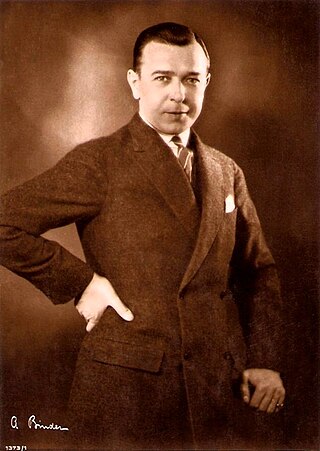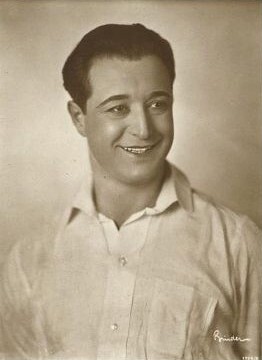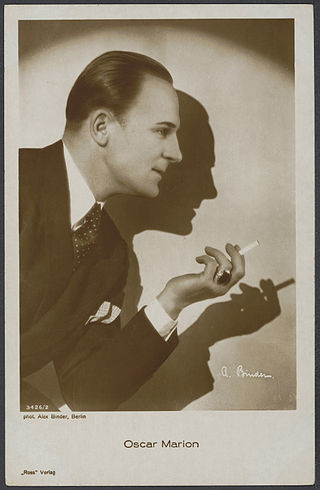Related Research Articles
Fritz Arno Wagner is considered one of the most acclaimed German cinematographers from the 1920s to the 1950s. He played a key role in the Expressionist film movement during the Weimar period and is perhaps best known for excelling "in the portrayal of horror," according to noted film critic Lotte H. Eisner.
Harry Hardt was an Austrian actor. The son of a military officer, he initially planned a military career for himself, studying at a military academy and serving during World War I. He later turned to acting, having a long career both in films and on television.
Erich John Waschneck was a German cameraman, director, screenwriter, and film producer.

Georg Alexander was a German film actor who was a prolific presence in German cinema. He also directed a number of films during the silent era.

Angelo Ferrari was an Italian actor known for his work in German cinema.
Lydia Potechina was a Russian actress. She emigrated to Germany in 1918. She was married to the Russian-German film producer Max Pfeiffer.

Leopold von Ledebur was a German stage and film actor.
Paul Anton Heinrich Rehkopf was a German actor.
Sophie Berg Pagay was an Austrian actress.

Oskar Marion was an Austrian film actor.
Erich Czerwonski (1889–1940) was a German art director. He designed the sets for around a hundred productions during his career. He died in 1940 after being struck by a train during a blackout.

Heinrich Peer was an Austrian stage and film actor. He appeared in around a hundred films during the silent era.
Karl Falkenberg was a German-Jewish film actor.
Hugo Döblin was a German stage and film actor. He appeared in more than eighty films, most of them during the silent era. The Jewish Döblin left Germany following the Nazi Party's rise to power in 1933, and after moving first to Czechoslovakia and Austria, eventually settled in Switzerland. His younger brother was novelist, essayist, and doctor Alfred Döblin (1878–1957).
Gerhard Ritterband (1904–1959) was a German film actor.
National Film or National-Film was a German film production and distribution company which operated during the silent and early sound era. In the early 1920s it made an attempt to take over Erich Pommer's Decla-Bioscop, but the projected merger failed and Decla instead joined with the major studio UFA. While Decla was generally in favour of joining with National, it was pressured by its creditors Deutsche Bank to merge with UFA.
Franz Stein (1880–1958) was a German cinematographer and film actor. During the silent era he shot a number of films, many of them for National Film. After 1925 his film appearances were exclusively as an actor.
Ernst Johann Pröckl was an Austrian stage actor and director. He also appeared in numerous films, mainly German.

Aywon Film Corporation was an American film distribution company of the silent era. Founded in New York by Nathan Hirsh it was active between 1919 and 1929. The company mainly released western and action films but also handled several foreign imports such as The Blue Danube, The Hands of Orlac, The Prude's Fall and The Pleasure Garden.
Uschi Elleot (1899–1975) was a German stage and film actress who starred in a number of silent films. She was the younger sister of actress Carola Toelle. After her cinema career ended she emigrated to the United States and married an American.
References
- ↑ Hardt p.238